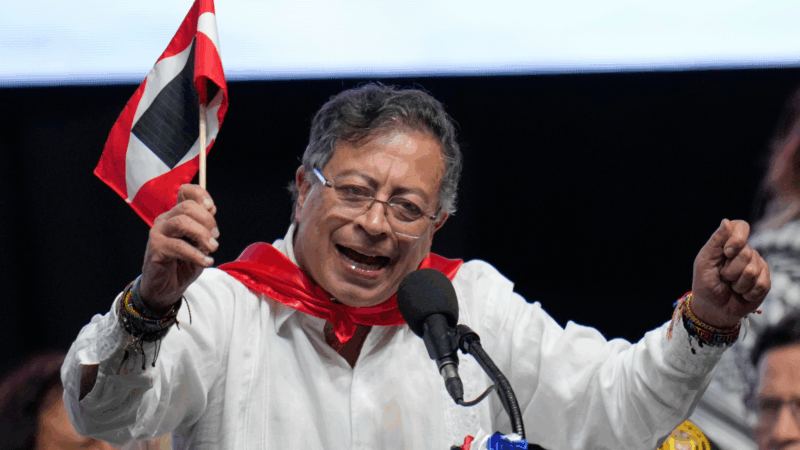U.S. imposes sanctions on Colombia’s president and family over drug trade allegations
WASHINGTON — The Trump administration imposed sanctions Friday on Colombian President Gustavo Petro, his family and a member of his government over accusations of involvement in the global drug trade, sharply escalating tensions with the leftist leader of one of the closest U.S. allies in South America.
The Treasury Department leveled the penalties against Petro; his wife, Veronica del Socorro Alcocer Garcia; his son, Nicolas Fernando Petro Burgos; and Colombian Interior Minister Armando Alberto Benedetti.
Petro “has allowed drug cartels to flourish and refused to stop this activity,” Treasury Secretary Scott Bessent said in a statement. “President Trump is taking strong action to protect our nation and make clear that we will not tolerate the trafficking of drugs into our nation.”
The move ramps up a growing clash between the Republican U.S. president and Colombia’s first leftist leader, notably over deadly American strikes on alleged drug-carrying boats off South America.
This week, the Trump administration expanded its crackdown to the eastern Pacific Ocean, where much of the cocaine from the world’s largest producers, including Colombia, is smuggled. And in an escalation of military firepower in the region, the U.S. military is sending an aircraft carrier to the waters off South America, the Pentagon announced Friday.
The U.S. last month added Colombia, the top recipient of American assistance in the region, to a list of nations failing to cooperate in the drug war for the first time in almost 30 years.
The penalties were expected after Trump recently said he would slash assistance to Colombia and impose tariffs on its exports, referring to Petro on social media in recent days as “an illegal drug leader.”
“He’s a guy that is making a lot of drugs,” Trump told reporters in the Oval Office on Wednesday. “He better watch it, or we’ll take very serious action against him and his country.”
After Trump accused him of having ties to drug trafficking, Petro on Wednesday said he would resort to the U.S. court system to defend himself.
“Against the calumnies that high-ranking officials have hurled at me on U.S. soil, I will defend myself judicially with American lawyers in the U.S. courts,” Petro wrote on X without naming Trump but citing a news report about his comments.
A day earlier, Petro’s anti-drug policy was the subject of a meeting between him and the U.S. chargé d’affaires in Colombia, John T. McNamara. McNamara also met with Foreign Minister Rosa Yolanda Villavicencio Mapy on Thursday.
Petro has repeatedly defended his policy, which moves away from a repressive approach and prioritizes reaching agreements with growers of coca leaf — the raw material for cocaine — to encourage them to switch to other crops, pursuing major drug lords and combating money laundering. He has said his government has achieved record cocaine seizures and questioned U.N. figures showing record coca leaf cultivation and cocaine production.
The amount of land dedicated to cultivating coca, the base ingredient of cocaine, has almost tripled in the past decade to a record 253,000 hectares (625,000 acres) in 2023, according to the latest report available from the U.N. Office on Drugs and Crime. That is about triple the size of New York City.
The Trump administration has surged military ships and planes to Latin America to target traffickers accused of funneling drugs to the U.S. Petro has pushed back against the strikes that have killed at least 37 people since they started last month, with the latest two targeting vessels in the eastern Pacific, where Colombia has a coastline.
Petro has repeatedly feuded with Trump this year. Petro initially rejected U.S. military flights of deported migrants, leading Trump to threaten tariffs. The State Department said it would revoke Petro’s visa when he attended the U.N. General Assembly in New York because he told American soldiers to disobey Trump’s orders.
HUD proposes time limits and work requirements for rental aid
The rule would allow housing agencies and landlords to impose such requirements "to encourage self-sufficiency." Critics say most who can work already do, but their wages are low.
Paramount and Warner Bros’ deal is about merging studios, and a whole lot more
The nearly $111 billion marriage would unite Paramount and Warner film studios, streamers and television properties — including CNN — under the control of the wealthy Ellison family.
A new film follows Paul McCartney’s 2nd act after The Beatles’ breakup
While previous documentaries captured the frenzy of Beatlemania, Man on the Run focuses on McCartney in the years between the band's breakup and John Lennon's death.
An aspiring dancer. A wealthy benefactor. And ‘Dreams’ turned to nightmare
A new psychological drama from Mexican filmmaker Michel Franco centers on the torrid affair between a wealthy San Francisco philanthropist and an undocumented immigrant who aspires to be a dancer.
Bill making the Public Service Commission an appointed board is dead for the session
Usually when discussing legislative action, the focus is on what's moving forward. But plenty of bills in a legislature stall or even die. Leaders in the Alabama legislature say a bill involving the Public Service Commission is dead for the session. We get details on that from Todd Stacy, host of Capitol Journal on Alabama Public Television.
Baz Luhrmann will make you fall in love with Elvis Presley
The new movie is made up of footage originally shot in the early 1970s, which Luhrmann found in storage in a Kansas salt mine.







